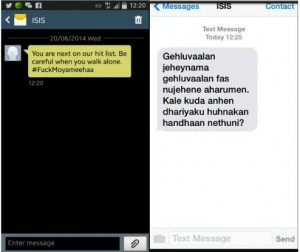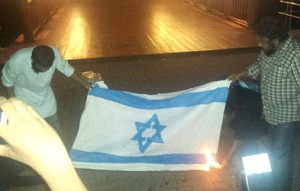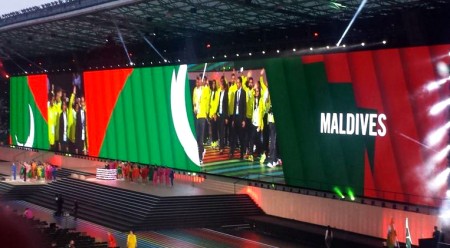Security services evacuated 34 tourists from Kaafu Thulusdhoo Island following unrest after an Israeli tourist destroyed an anti-Israel placard yesterday (July 28).
Thirty Israeli tourists, and four of other nationalities, agreed to be evacuated last night after police intelligence revealed that more protesters were travelling to the island to join those calling for the guests’ removal.
Managing Director of the Batuta Maldives Surf View Mohamed Hashim said the incident occurred outside his guest house, after an Israeli surfer took down a placard featuring a swastika alongside the Israeli flag and snapped it in two.
Anti-Israeli sentiment has been growing in the Maldives as the escalating conflict between Israel and Palestinians continues to result in heavy civilian casualties in Gaza.
As news of yesterday’s incident spread locals became agitated, explained Hashim, who subsequently informed Island Council President Ahmed Anees. Anees then contacted the police.
Around 30 additional protesters subsequently travelled to Thulusdhoo from Malé and were detained upon arrival, said Anees, being kept at the local station and the island’s social centre.
“Police intelligence said that more were coming from Malé,” explained Anees. “They said it was the best thing that they leave for the night.”
A police spokesperson has said that they provided assistance to the Thulusdhoo Island Council and the Ministry of Tourism, although they declined to give further details.
Neither Anees nor Hashim were certain of the guests’ current whereabouts while officials from the tourism ministry were not responding to calls at the time of publication.
Anees explained that 10 tourists – all non Israelis remained in – the island, while those protesters detained by police were released after the Israeli tourists’ evacuation at midnight yesterday.
Thulusdhoo guest houses
Nine guesthouses have been registered in Thulusdhoo since the relaxation of guest house policy in an industry still dominated by the high end one island/one resort model.
The island – just forty minutes from Malé – is home to one of the countries’ top surf breaks, with a majority of bookings coming from Israeli surfers, explained Council President Anees.
“This is a big loss for us because most of the people depend on guest houses,” he explained, pointing out that this type of incident was unprecedented on the island.
“It is a calm island. Only a few people were involved in this thing,” he explained, suggesting that the unrest had been fomented by outsiders from Malé.
Guest house manager Hashim – who lost all 8 of his guests last night – also suggested that the incident may have been due to the large number of non-locals present on the island for the Eid holiday.
“There have been no problems since we opened two years ago. Tourists are always very friendly with locals,” said Hashim who noted that around 60 percent of his bookings came from Israelis.
“It is a big blow for our business. There are three months of surfing left. I don’t know what we will do now.”
Israeli tourists represent only a small fraction of tourist arrivals to the Maldives, making up just 0.3 percent of the more than one million people who visited the country in 2013.
Anti-Israeli sentiment
The incident in Thulusdhoo was followed by small but vocal protests in the capital Malé during which protesters burned the Israeli flag.
Maldivians have been increasingly active in their calls for an end to the bloodshed in Gaza, with an estimated 13,000 marching through the capital Malé in solidarity with Palestinians earlier this month. Smaller demonstrations were held throughout the country.
 Last week the government announced a boycott – admittedly symbolic – of Israeli products and the annulment of all cooperation agreements signed since the resumption of diplomatic ties in 2009.
Last week the government announced a boycott – admittedly symbolic – of Israeli products and the annulment of all cooperation agreements signed since the resumption of diplomatic ties in 2009.
“I do not think Maldivians want any help from Israel or want to keep up relations with Israel,” said Foreign Minister Dunya Maumoon who has described recent attacks on UN shelters in Gaza as “cowardly and shameful”.
During last week’s meeting of the UN Human Rights Council, the Maldives joined 28 other member states in calling for an independent inquiry into Israel’s violations of international humanitarian and human rights laws in Palestine.
Maldivian citizens have also donated over MVR2million (US$130,000) to the Gaza Fund which will be distributed via the Qatari Red Crescent after August 17.
Likes (2)Dislikes
(2)Dislikes (0)
(0) 

